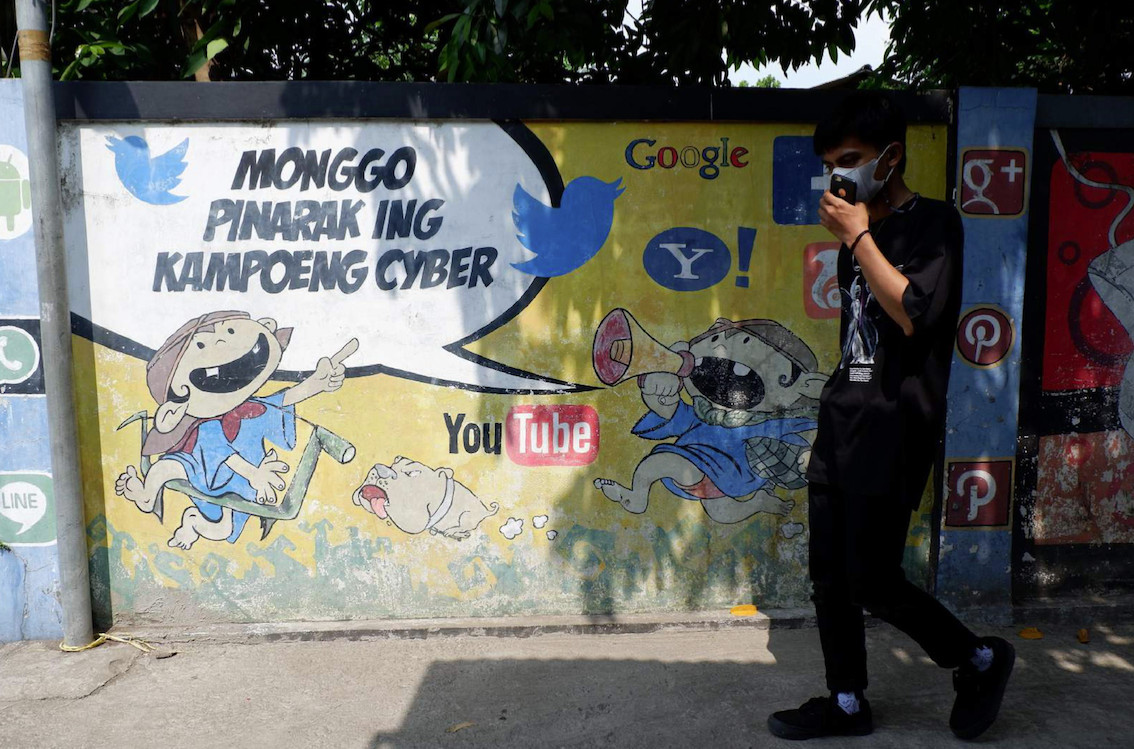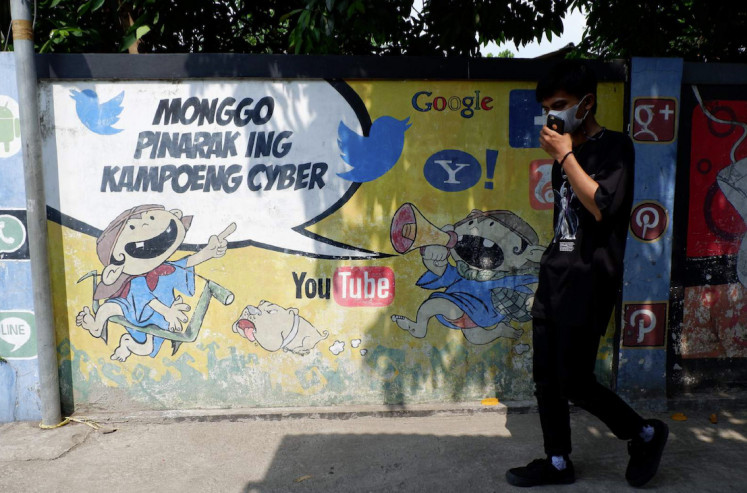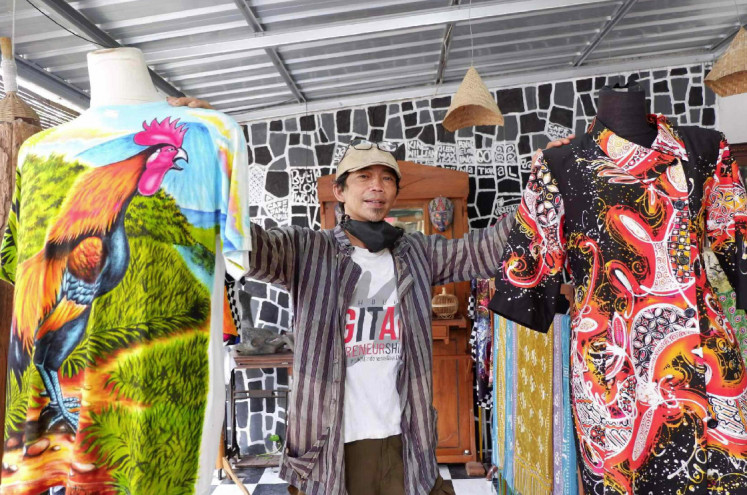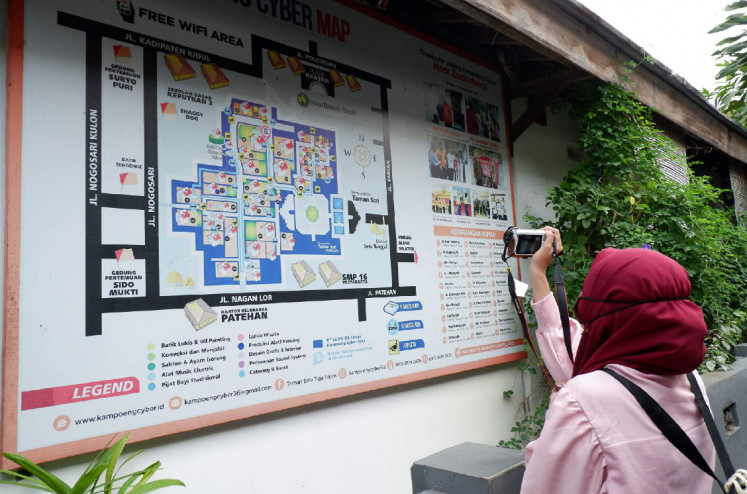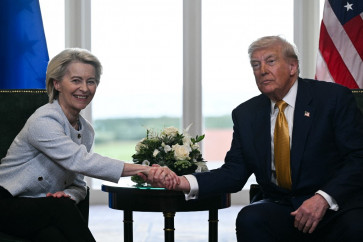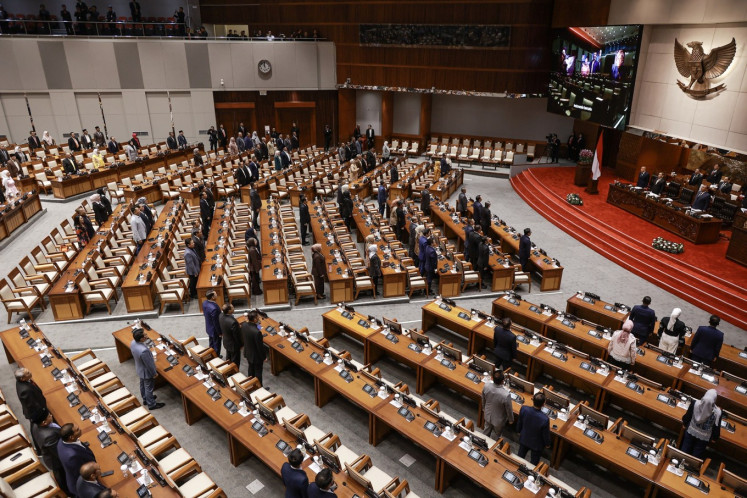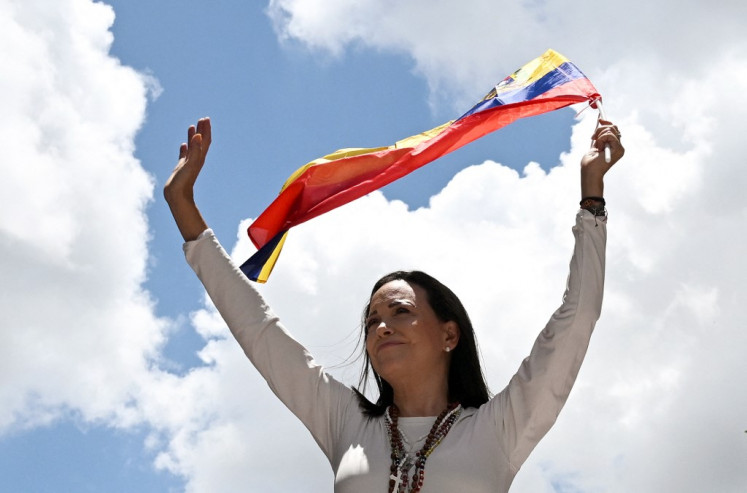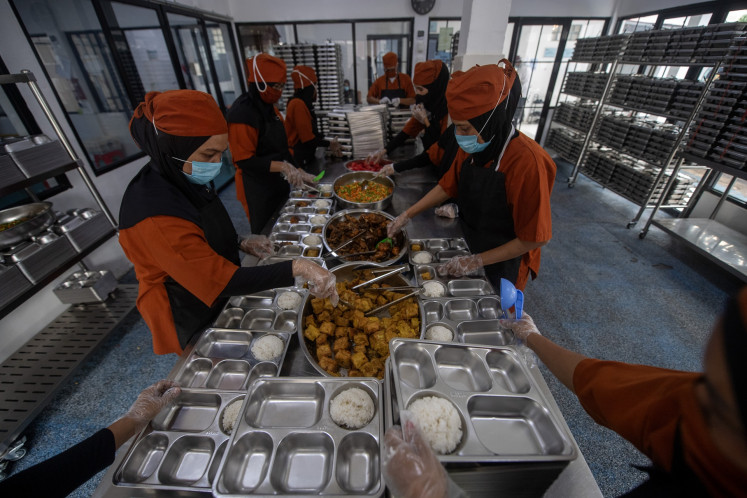Popular Reads
Top Results
Can't find what you're looking for?
View all search resultsPopular Reads
Top Results
Can't find what you're looking for?
View all search resultsHow one man transformed a regular village into a cyber-kampung
Kampoeng Cyber, a village in Yogyakarta, has made headlines for attracting big names such as Facebook cofounder Mark Zuckerberg, King Willem-Alexander of the Netherlands and his wife Queen Maxima.
Change text size
Gift Premium Articles
to Anyone
Antonius Sasongko Wahyu Kusumo knows how to transform a kampung into a digital village.
As its name implies, Kampoeng Cyber, located in Patehan subdistrict, Yogyakarta, has made technology an integral part of its residents’ working lives, with a high-speed internet connection that pervades business and public spheres.
Kampoeng Cyber is within the compound of the Kraton, home to Yogyakarta Governor Sri Sultan Hamengkubuwono X.
If you visit his water castle, Taman Sari, and explore tourist spots across the site, from royal swimming pools to a historic underground mosque, you will pass through Kampoeng Cyber. The village is pleasant to look at, with colorful murals decorating alleys, houses and shops that sell products such as batik shirts, paintings and handicrafts.
“We feel honored that this kampung was once visited by the king of another country. Our king [Sri Sultan] has never visited this kampung, despite its popularity and close proximity [to his residence],” said Antonius Sasongko Wahyu Kusumo, the head of the kampung’s neighborhood unit (RT), laughing.
Champion of progress
Sasongko is the man behind the digital innovation in Kampoeng Cyber. In May, he was named one of 20 local champions by the Communications and Information Ministry for his contributions to the digital transformation of RT 36 into Kampoeng Cyber.
“I have been assigned [by the ministry] to hold events in Yogyakarta to spread awareness about digital literacy,” he said.
Modern neighborhood: A mural illustration welcomes visitors to the Cyber Village. (JP/A. Kurniawan Ulung) (JP/A. Kurniawan Ulung)In Kampoeng Cyber, all households have a high-speed internet connection, and free Wi-Fi is accessible to all, including tourists. The service is fully financed by the kampung’s residents.
“This kampung has been developed by residents. We are financially independent and have never involved the Yogyakarta administration,” said Sasongko.
The residents of the kampung use the internet not only to keep in touch with their friends and family, but also to improve business productivity and sales. Some 50 percent of the residents run small or medium enterprises (SMEs), such as batik galleries, silk-screen studios or art galleries.
With good internet access, the villagers have been able to improve their access to the domestic market and tap into the foreign market. Since 2015, they have been actively marketing their products and services on social media platforms, such as Facebook and Instagram, and on Kampoeng Cyber’s community business platform, kampoengcyberdaya.com.
The textiles of Batik’e Lok Iwon, for example, are on display on the website, with prices starting from Rp 200,000 (US$13.83).
Making lives easier
RT 36 is home to 49 households, according to Sasongko, who has been the head of the RT since 2015. He also utilizes technology to serve his residents through the website siwargapatehan.com. The site replaces paper documentation in the kampung with electronic databases for business and administrative records.
The website also facilitates online communication between Sasongko and his residents. If the villagers need a reference letter from the village head to obtain a police clearance letter (SKCK), for instance, they do not need to meet him in person.
Better life: The press has also helped the businesses of the villagers, bettering their lives significantly. (JP/A. Kurniawan Ulung) (JP/A. Kurniawan Ulung)They just need to log into their personal account from a computer or smartphone. After they submit their application, Sasongko receives a notification and he can send them the document they have requested. They can also offer suggestions or criticism through the website.
“Even if I’m not at home, I can serve them,” he said. “In other RTs, residents still need to visit the RT head’s house, and if [the head] is not at home, they need to wait. I don’t want my residents to experience such things.”
For Sasongko, internet technology has been indispensable since he started a new career as a freelancer. The internet connection at his home has enabled him to enjoy a flexible work environment, including working from home.
When he discovered in 2008 that he was the only resident of the kampung who had internet at home, he decided to introduce his neighbors to the technology.
He believed that if the residents of RT 36 had internet connections at home, they would not only have access to an endless supply of knowledge and information but would also enjoy other advantages, such as working online and wider networking opportunities.
Inspired
Before becoming a freelancer, Sasongko worked at a publishing company. He saw there how his office used e-commerce methods to sell books. He thought that small-scale enterprises, too, could benefit from selling their products online directly to customers, instead of selling to middlemen.
If they went digital, he thought, they could find potential customers throughout the world.
“I don’t want them to sell goods in a conventional way only,” said the graduate of the Indonesia Arts Institute (ISI) in Yogyakarta.
Sasongko was not alone in his efforts to improve the kampung’s digital connectivity. He teamed up with Antonius Heri Sutanto, who was the RT head that year.
Interconnected: A visitor takes a photo of the village's map, which shows every key locations, including the businesees there. (JP/A. Kurniawan Ulung) (JP/A. Kurniawan Ulung)At the time, few of the residents knew much about the internet, but they showed interest in the technology after Sasongko and Heri introduced them to it. However, the residents did not have computers.
Some residents then chipped in to buy and assemble a basic computer. They placed it at a village patrol post so everyone had access to it.
At the post, Sasongko showed the residents how the internet worked and how it could improve their working lives.
“We taught them how to use the computer and surf the internet from zero, starting from basic steps like how to turn on the computer,” he said.
He then asked for permission from Atmajaya University in Jakarta to use its computer laboratory to hold a week-long computer course for the residents of the RT, including children, teenagers and senior citizens.
Technological challenges
Learning the technology was challenging for the residents of RT 36. The elderly, for example, found it hard to remember the passwords to their email accounts. Sasongko was relieved to see that they did not easily give up during the course.
“[The senior citizens] made new email addresses many times because they often forgot their passwords. So I asked them to write the password on a small piece of paper and save it in their wallet,” Sasongko said, laughing.
Training the residents to adopt the technology took seven years, said Sasongko. By 2015, they were all digitally literate and each had a computer at home. Since then, the internet has been an inseparable part of their daily lives.
Iwan Setiawan, the owner of gallery Batik’e Lok Iwon, said digital literacy had helped him broaden his horizons. He had not only found websites that contained answers to many questions on his mind, he had also gotten new customers from countries such as Japan, Australia and Norway.
He said that before the COVID-19 pandemic occurred, he once saw his sales soar by some 200 percent thanks to the internet.
Among his foreign customers was King Willem-Alexander. Iwan was thrilled when the king purchased his contemporary classic batik shirt when visiting Yogyakarta in March 2020.
Iwan was grateful to Sasongko for digitally transforming the kampung. He said he would never forget when he learned to use the internet and set up an email account in 2008.
“Although I have new email addresses, I still use my first-ever email account. The account is memorable,” he said.

